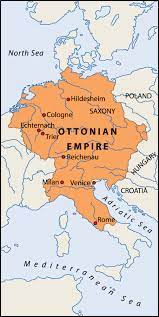This generous adventurer, prompted by an insatiable thirst for information, is said to have secretly withdrawn himself from his monastery of Fleury in Burgundy, and to have spent several years among the Saracens of Cordova. Here be acquired a knowledge of the language and learning of the Arabians, particularly of their astronomy, geometry and arithmetic; and he is understood to have been the first that imparted to the north and west of Europe a knowledge of the Arabic numerals, a science which at first sight might be despised for its simplicity, but which in its consequences is no inconsiderable instrument in subtilising the powers of human intellect. He likewise introduced the use of clocks. He is also represented to have made an extraordinary proficiency in the art of magic; and among other things...
The italics are mine. A little further along, Godwin adds a footnote that tells us his information comes from William of Malmesbury. William (c.1095 - c.1143) was the foremost English historian of the 12th century. Not exactly a contemporary, but maybe near enough that the memories and stories were still fresh? It would be difficult to determine the accuracy of this report, especially in the context of a brief blog post. Fortunately, I don't have to.
As it turns out, Marek Otisk of the University of Ostrava (Czechoslovakia) published an article on this very topic in September 2020, Gerbert of Aurillac (Pope Sylvester II) as a Clockmaker. He examines the reports from William of Malmesbury, the Chronicle of Thietmar of Merseburg (died c.1018), and a much later record (someone who died in 1610). Among his detailed examination of these and other historical records we learn that although William claims Gerbert built a clock in Reims, a friend of Gerbert's (Richest of Reims), writes about Gerbert's stay in Reims in detail and never mentions a clock. Otisk concludes that William's ascribing of the creation of a clock to Gerbert cannot be trusted.
The later report by the Benedictine monk Arnold Wion, who died about 1610, claims Gerbert built a clepsydra, a water clock, in Ravenna. What we know of Gerber's time in Ravenna, however, is that it was very short; again, no contemporary accounts support this story.
Thietmar of Merseburg tells a different story, that Gerbert created a clock in Magdeburg. Thietmar was a bishop and close friend of Holy Roman Emperor Henry II, who succeeded Otto III, credited with making Gerbert into Pope Sylvester II. Thietmar's Chronicle includes a specific detail about Gerbert creating, in Magdeburg, "created clocks (horologium) which he correctly calibrated according to the Polar star (stella, dux nautarum) which he observed through an observation tube (fistula)." [Otisk, p.32] Otisk likes this account because both Thietmar and Gerbert were in Magdeburg in the late 990s, and very likely crossed paths several times.
The use of the word horologium is misleading, however. We use it for the word "clock," but it is more likely that Gerbert was creating a calibrated armillary, or possible even an astrolabe, which he knew about from his exposure to science being done by Islamic philosophers.
So I can't tell you who created the first mechanical clock. But the question of horologium remains: when long-ago writers refer to "clocks," what exactly did they mean? What constituted a clock? There were several ways to measure time without staring at the sun and judging, and I'll talk about those devices tomorrow.

